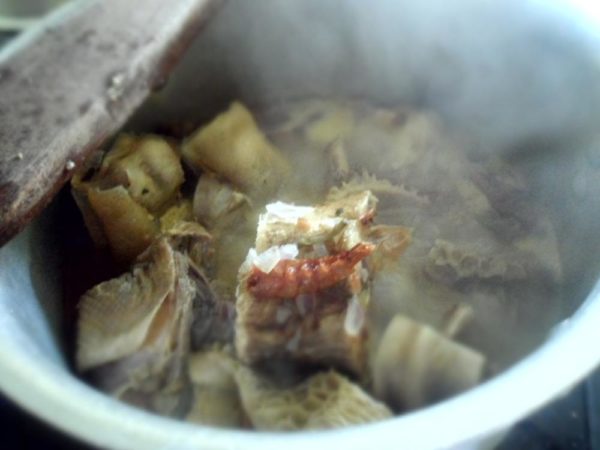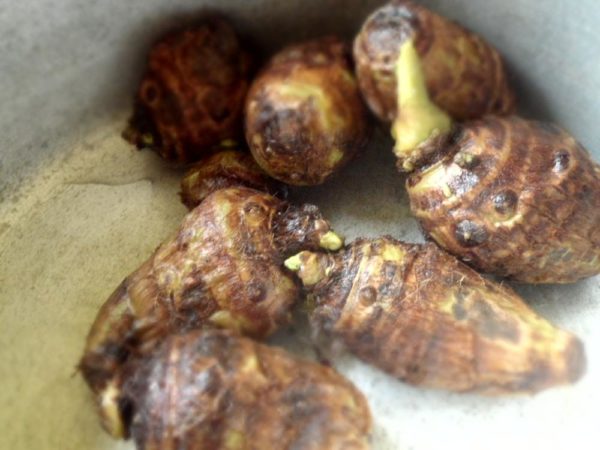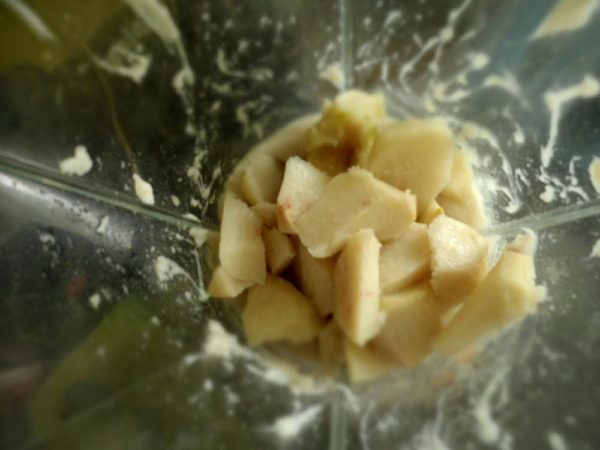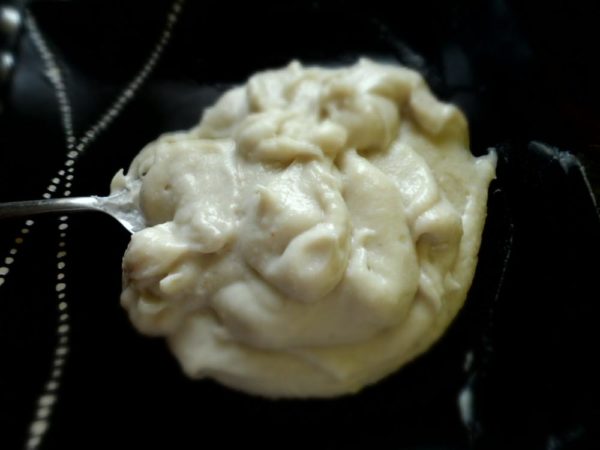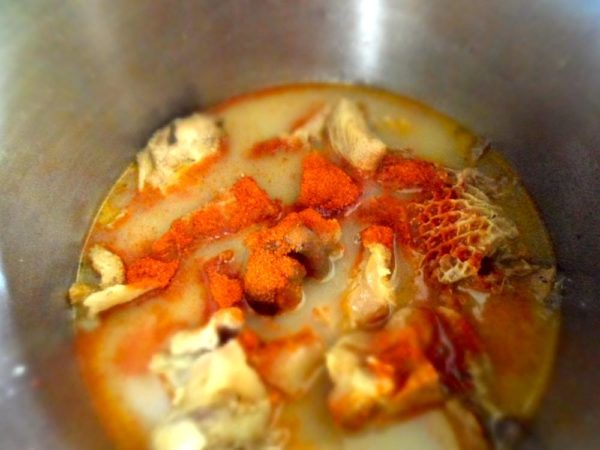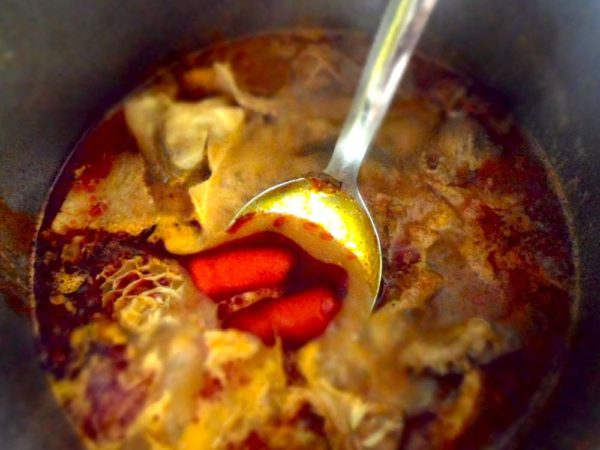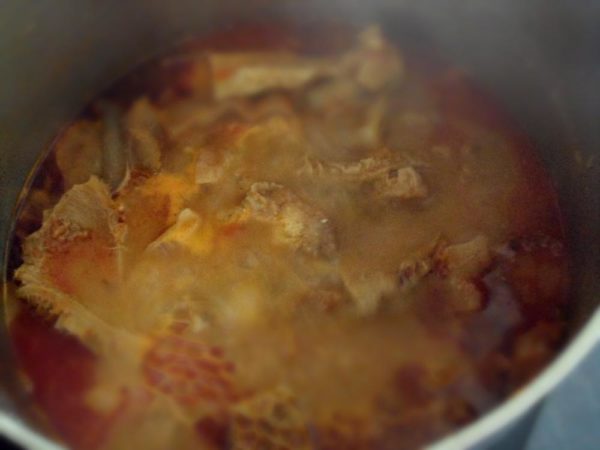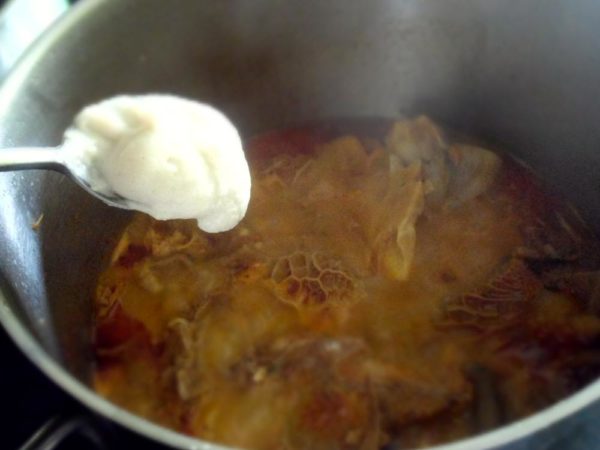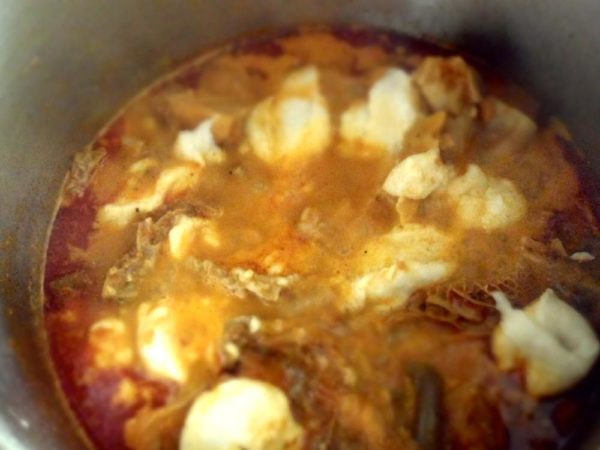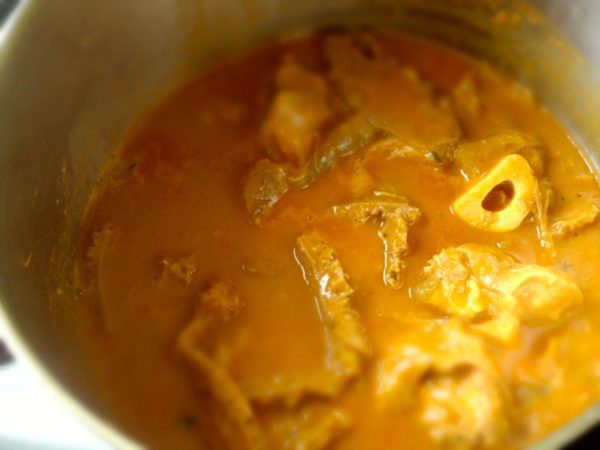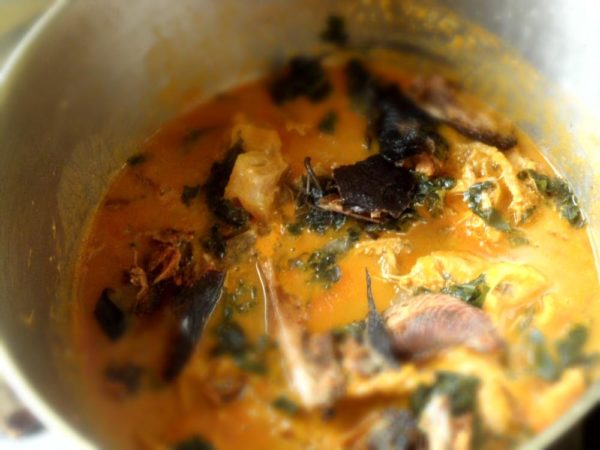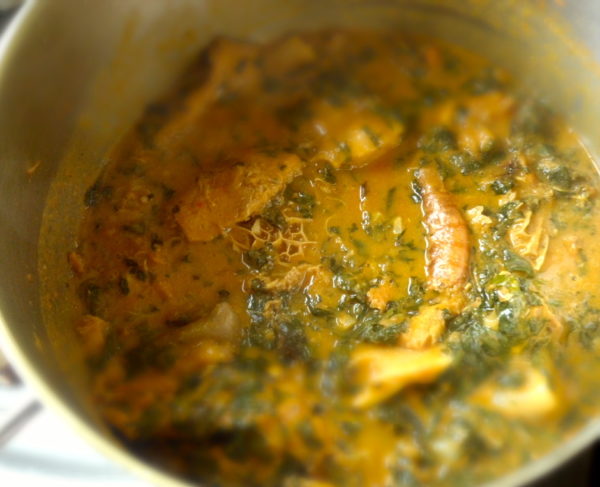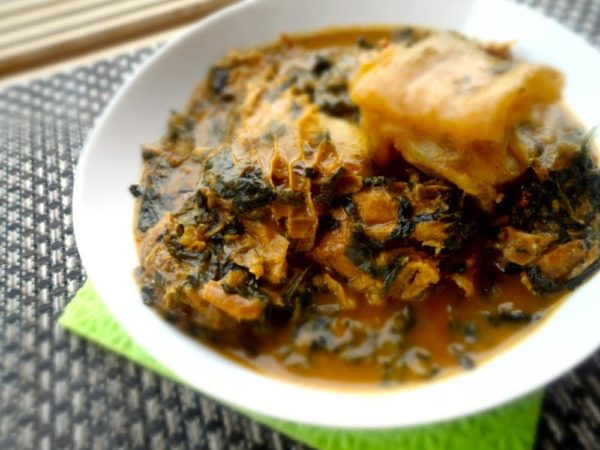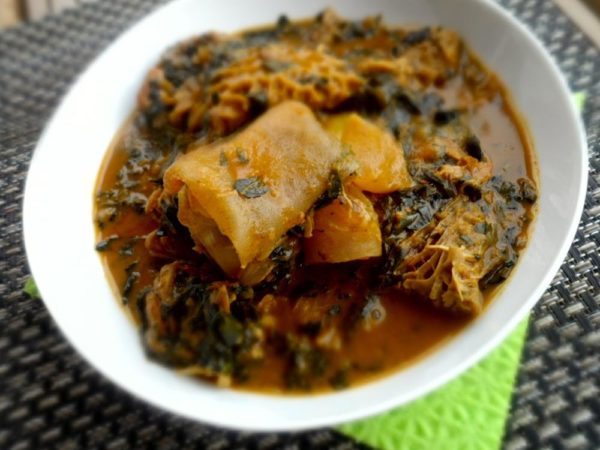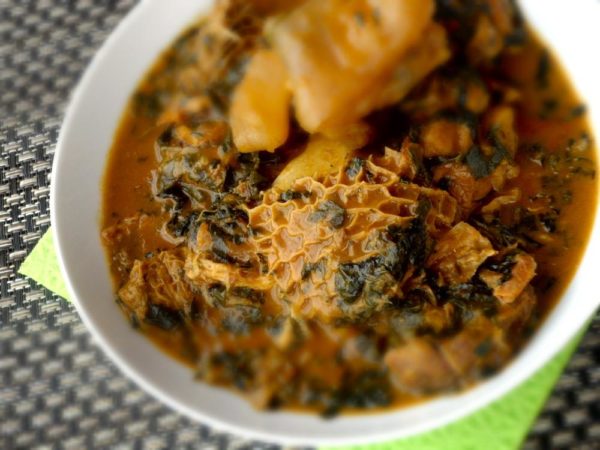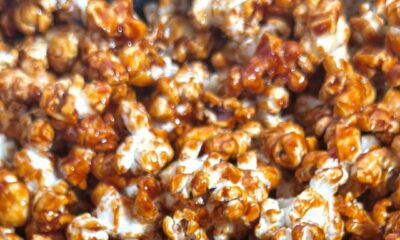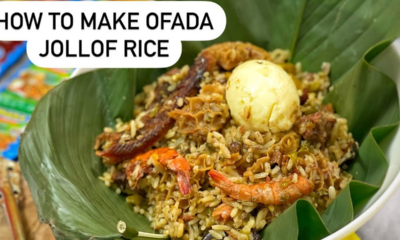News
BN Cuisine with Dooney’s Kitchen: The Ofe Owerri Controversy
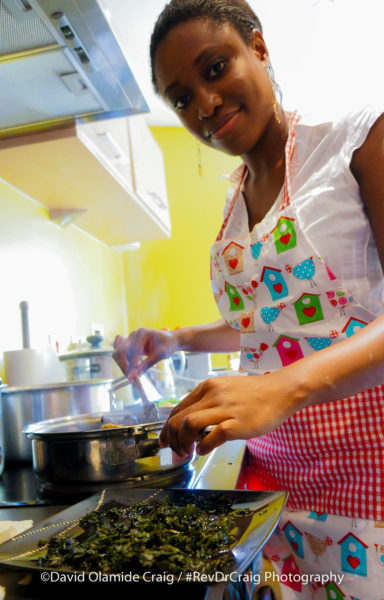 First, I will like to give a big shout out to Chef Fregz, for his post on The Saks Fifth Avenue Pantry. I was reading through and grinning like a Cheshire cat, because I had all the ingredients he mentioned. I felt like an Upper East Side cook that day. His post gave me the push I needed to use the saffron lounging in my cupboard for Paella Valenciana, which I loved, loved, loved. As for the lobster in the freezer, errrr, I am still saving it for a special occasion. Thanks Chef Fregz. Another big shout out to Olamide Craig for my profile picture. Good job bros. It was a pleasure working with you for one day.
First, I will like to give a big shout out to Chef Fregz, for his post on The Saks Fifth Avenue Pantry. I was reading through and grinning like a Cheshire cat, because I had all the ingredients he mentioned. I felt like an Upper East Side cook that day. His post gave me the push I needed to use the saffron lounging in my cupboard for Paella Valenciana, which I loved, loved, loved. As for the lobster in the freezer, errrr, I am still saving it for a special occasion. Thanks Chef Fregz. Another big shout out to Olamide Craig for my profile picture. Good job bros. It was a pleasure working with you for one day.
Today, I am going to be stirring up a food controversy. Why is it a controversy? Well, people can’t seem to decide what ingredients go into it. With most Nigerian dishes I have come across, the ingredients are somewhat standard. Irrespective of whom you ask, or what recipe you use, the ingredients are universal, methods may differ though. Not the same with this amazing dish called Ofe Owerri. Ofe is an Igbo word for ‘soup’, and of course, Owerri is the capital of Imo State. I got introduced to Igbo soups by my friend Amaka Akaraiwe from Anambra State. She taught me how to make many Igbo soups and dishes from scratch starting with Ofe Onugbu (bitter leaf soup) and Oha soup, which I make so well now, she would be proud. I have also built upon that knowledge with many other dishes over time. I thought of what to write for my next Bella Naija post, and I just knew I was going to go with a dish from the East, as to my knowledge, it had not featured on BN Cuisine before.
Here were my mental ramblings. Ofe Onugbu I had already blogged about. Ofe Akwu which I cook very well is the Igbo version of Banga Soup, but I had written about Banga Soup on BN Cuisine, so I struck it off the list as it will seem lazy and show no versatility in my cooking. Oha Soup was another option but I did not have the Oha or Ora vegetable, so that was out. Abacha (african salad) and Ugba, Nkwobi, Ogbono soup and Okra soup (the igbo way) I had already blogged about. Ofe Nsala (white soup), is also on the blog, thanks to Ms Socially Awkward who sent in an amazing recipe (shout out to her). Ukazi Soup, naaa, it is the Igbo version of Afang Soup (save for the addition of Egusi), which I have also blogged about, another lazy escape.
You see, I was slowly running out of options and the sneaky little part of me moved on to the Efik Tribe as I cook most of their dishes very well, thanks to my Calabar friend Joy who was my tutor. As many of their dishes are already on the blog, save for some which I don’t yet have the ingredients for. Afia Efere the Efik version of Ofe Nsala, was a nice option and slightly different in ingredients, but lazy too, so I dropped it. Ekpang Nkukwo is quite a tedious dish, but I dropped the idea the minute the thought cropped up. I really wanted to write about a dish from the East to please the Ndigbos who have only gotten a mention so far on BN Cuisine. When I get a foodie version of writers block, I open all my food compartments (raw + frozen) and let their contents speak to me.
Thankfully they did and Ofe Owerri jumped out at me. Yippeee. My joy was cut short because I knew it will stir up controversy. Then I thought, what the heck, I’ll go ahead. It will be a good opportunity to start up a discussion and learn from Bella Naijarians.
Why the controversy? Well there is no general consensus on which vegetables are used in this soup unlike other Igbo soups. Some say Ugwu alone, others say Ugwu and Uziza. You hear from someone else and she will say no no, it is Ugwu and Ukazi, or it is Ugwu and Oha. Other people will disprove that, and say no no, it is Oha, Uziza and Ukazi. Ugwu is not involved at all. Meanwhile all these people are stamping a claim of authenticity on their recipe and calling the rest fake Ofe Owerri. Oh, I am from Owerri, or my mother is from Owerri, oh this is my father’s favourite soup, we cook it every time. I know what I am saying, I grew up in Owerri, it is cooked this way. No you don’t use that. To use Isam (periwinkles) or to not use Isam, another controversy. Did I mention Ogiri too, which is also contested. Geez, can all of you just agree on something and stop confusing people like me, who just want to learn. I looked to my friend’s mum who is from Owerri, and she said Ugwu and Uziza. I just stopped there and ran with it. I looooooove cooking with Uziza (in ogbono soup and groundnut soup), I did not need further convincing. So with guidance from Mummy Cynthia, here’s my Ofe Owerri.
You will need
An assortment of Meats
1 piece of Stockfish
1/2 – 1 piece of Smoked fish (depending on the size) – Asa fish, i think that is the Igbo version of Eja Osan
1 cup of Red Crayfish – the big smoked variety
1 cup of Crayfish
1 handful of Isam (periwinkles) – if you can source
A couple of snails – if you can source
1 bunch of Ugwu leaves – chopped
2 bunches of Uziza leaves (chopped)- these come packed really small
Dry pepper – use as per your spicy tolerance level
7 tubers of Ede (cocoyam) – the small variety
1 wrap of Ogiri Okpei
2 cooking spoons of Palm Oil
Salt
Seasoning Cube
How To
Season and boil the meats. Add a strong flavoured smoked fish to the pot, shortly before the meats have softened, to give the stock extra depth of flavour. Get it right from here and you will not need salt or seasoning cube by the tail end of cooking. This time I added a big piece of stockfish and red crayfish.
For the benefit of people who don’t know what Uziza leaves look like, here it is.
Boil the Cocoyam in lots of water for 10 – 15 minutes. Do NOT add salt.
Afterwards, pierce with a fork, it should go straight through. Take it off the heat, and let it cool down. Once it is warm enough to touch, gently peel the skin off the cocoyam and pound in a small mortar if you have one. Otherwise chop into small bits and use a blender or food processor. Add hot water in spoonful bits, to allow the machine combine it properly.
You only need a little water, because you want a thick cocoyam paste, which will be used to thicken the soup.
Once the contents of the pot of meat, fish and crayfish have softened, taste the stock and be sure you are happy with it. Add dry pepper (I used 2 heaped tablespoons) and let it combine with the stock for a minute or two.
Add the palm oil and wrap of Ogiri. Ensure that the stock is bubbling vigorously by the time you add the palm oil, so it doesn’t curdle.
Once the palm oil is in, make sure it dissolves into the stock almost completely. What you want to achieve is a stock where only bits of palm oil are floating on the periphery of the pot. You need at least 3 – 5 minutes for this to happen. If you still have big patches of palm oil floating on top, the palm oil will have a curdling taste on your tongue.
Taste the stock, you should taste the ogiri and the palm oil by now. Add the crayfish – I rinse mine with water to remove dirt, and roughly blend. Using a tablespoon or your fingers, drop in portions of the cocoyam paste into the bubbling stock.
Once you have everything in, lower the heat and watch the cocoyam paste dissolve into the stock and thicken it.
You will also notice a colour change – a light shade of orange. If you are adding anything else to the soup, now is the time to add it. e.g. snails or periwinkles. If the soup is too thick, add beef stock. If you don’t have any, add water. Be careful not to drown the soup though and taste afterwards.
Once the cocoyam paste has dissolved completely, add the uziza leaves, shredded smoked fish and stir. Wait for a minute or two, you should smell the uziza leaves, then add the Ugwu leaves and stir.
Still with the heat lowered, let the vegetables cook for 3 – 5 minutes, and you are done.
As mentioned above, I did not need to re-season with salt and seasoning cube. My stock was just sufficient. Remember to taste after each step and re-season if you need to.
Here is my Ofe Owerri. Igbo KWENU, KWENU, KWEZUENU!!!!!
I love this soup. The combination of Ugwu and Uziza is just wonderful, the aroma, the taste.This soup is a winner. I served it for Sunday lunch with Pounded Yam (food processor to the rescue) and zonked off on the couch afterwards. I did not have Yellow Garri, otherwise it would have been my first choice. I love the Ugwu-Uziza combination, I am glad I did not use Ukazi. Please join the discussion, my esteemed and knowledgeable Bella Naijarians. How do you cook Ofe Owerri?
Don’t forget I am now bringing The Dooney’s Kitchen Experience right into the comfort of your own kitchen, via a never been done revolutionary service called an e-Cooking Class i.e. an Online Real-Time Video Cooking Class. From start to finish of any dish of your choice, I will be virtually in your kitchen, guiding you through the steps, as if I was cooking the dish myself. A fun and personal experience that goes way beyond reading a recipe. Or you can sign up for a physical hands-on cooking class. If you no longer want to just salivate over my food, I now offer a meal drop off and pick up service, including the service of a Private Chef for intimate dinners and small gatherings. Keep in touch!
_________________________________________________________________________________
Dunni Obata is an IT Project Manager by day and a cook the rest of the time. She loves entertainment and one of her bad habits is feeding people. When she’s not cooking, she’s watching the Food Network. Dunni is very passionate about Nigerian food and believes it has a lot to offer globally. Visit her blog – www.dooneyskitchen.com

